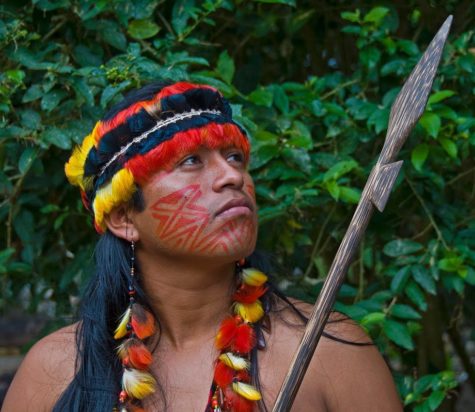Historical Tidbits
About The Shuar
“I was born to die fighting.”
~Shuar saying
Although there have been many headhunting cultures throughout the world, only one group is known for practice of shrinking human heads (tsantsa). This same tribe is the only tribe of American Natives to have successfully revolted against the Spanish Empire. They withstood armies of gold-seeking Incas, defied the early conquistadors, and thwarted all subsequent attempts by the Spaniards to conquer them. They are the Shuar.
There are four Shuar tribes known to inhabit the tropical forest of the Ecuadorian and Peruvian Amazon. The Achuara, Aguaruna, Huambisa, and the Shuar. In the past, these four tribes were commonly referred to as the Jivaro (pronounced hee’-va-ro).
The Shuar are a proud people, and are known to be an intensely warlike group, tremendously protective of their freedom and unwilling to subordinate themselves to other authorities. They have a reputation for fierceness, and savageness directed toward their enemies.
Early Spanish chronicles relate that in the year 1599, the Shuar banded together and killed 25,000 white people in raids on two settlements. In particular, the massacre of the Logroño stands out as particularly ruthless. The attack was instigated over the natives being taxed in their gold-trade.
After uncovering the unscrupulous practices of the visiting governor, molten gold was later poured down his throat until his bowels burst. Following his execution, the remaining Spaniards were killed along with the older women and children. The younger useful women were taken as prisoners to join the clan. The settlement itself was raided and burned to the ground.
From this point onward, the “Jivaro Indians” remained unconquered in their forest fastness east of the Andes, despite the fact that they inhabited one of the richest regions in South America for gold deposits. Their fierce fighting reputation and head-shrinking practice continued to discourage outsiders from entering their territories.
Tales of their fierceness became part of the folklore of Latin America, and their warlike reputation spread in the late nineteenth and early twentieth centuries when Jivaro “shrunken head” trophies found their way into the market places of the Western world.
In the first decades of this century, the Shuar also became known not as just a warlike group, but as an individualistic people intensely jealous of their freedom and unwilling to be subservient to authority even among themselves. In later years, the violence has subsided as they work to preserve their culture. their freedom, and to preserve the rainforest.
Sources:
- National Geographic Magazine, October 1921
- The Jivaro:People of the Sacred Waterfalls by Michael Harner






